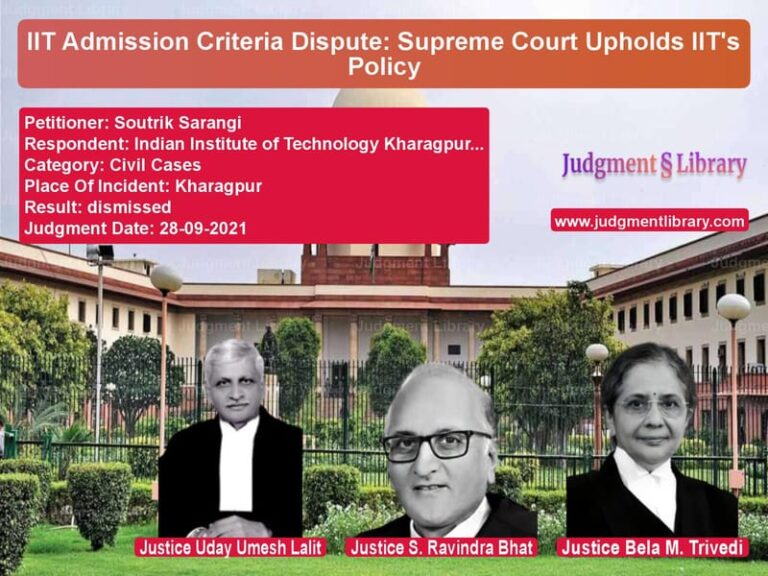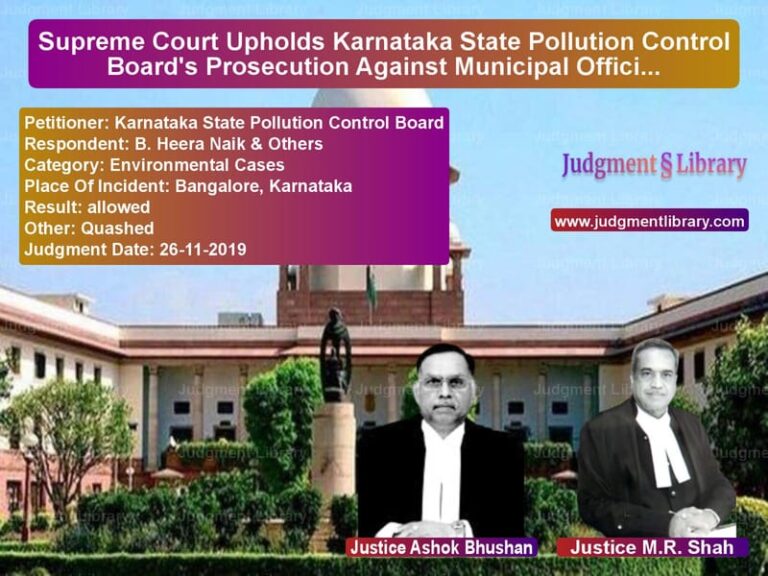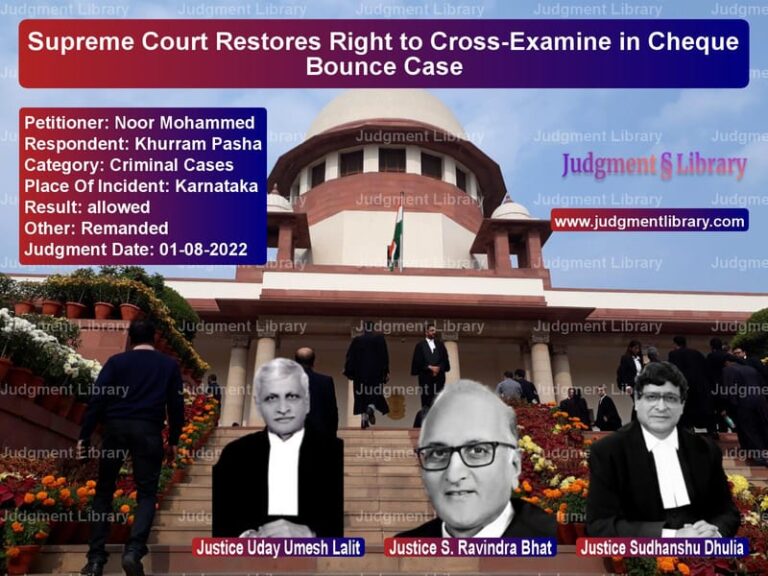Preventive Detention Under COFEPOSA: Supreme Court Quashes Detention Order for Violation of Fundamental Rights
The case of Jaseela Shaji vs. The Union of India & Others revolves around the preventive detention of the appellant’s husband, Appisseril Kochu Mohammed Shaji, under the Conservation of Foreign Exchange and Prevention of Smuggling Activities Act, 1974 (COFEPOSA). The Supreme Court quashed the detention order on the grounds of non-supply of crucial documents and delay in deciding the detenu’s representation, which violated Article 22(5) of the Constitution.
Background of the Case
The detenu, Shaji A.K., was detained under an order dated August 31, 2023, issued by the Joint Secretary (COFEPOSA), Central Economic Intelligence Bureau, Department of Revenue. The order cited his involvement in illegal foreign exchange transactions and hawala dealings. He was taken into custody on September 2, 2023, and lodged in Central Prisons, Poojapura, Trivandrum, Kerala.
The appellant, his wife, challenged the detention before the Kerala High Court through a habeas corpus petition, which was dismissed on March 4, 2024. The matter was then brought before the Supreme Court.
Key Legal Issues
- Was the non-supply of critical documents, particularly the statements of a key witness, a violation of Article 22(5) of the Constitution?
- Did the delay in considering the detenu’s representation render the detention illegal?
- Could the subjective satisfaction of the detaining authority be sustained if key evidence was missing?
Arguments by the Appellant
The appellant’s senior counsel argued that:
- The detaining authority did not apply its mind correctly and relied on insufficient material to justify the detention.
- The statements of Ms. Preetha Pradeep, a key witness, were relied upon but never provided to the detenu, violating his right to make an effective representation.
- The detenu’s representation submitted on September 27, 2023, was never received by the detaining authority and the central government due to mismanagement by the jail authorities.
- The delay in deciding the representation (which was ultimately rejected only in June 2024) amounted to a violation of fundamental rights.
Arguments by the Respondents
The respondents, representing the Union of India, countered that:
- The detaining authority relied on multiple statements, including that of Suresh Babu and various WhatsApp chats and call records.
- The omission of Ms. Preetha Pradeep’s statements did not affect the overall justification for detention.
- The advisory board had independently reviewed the case and confirmed the detention.
- The delay in deciding the representation was due to procedural issues but did not vitiate the detention.
Supreme Court’s Observations
1. Non-Supply of Crucial Documents
The Court held that failing to provide copies of key documents violated Article 22(5) of the Constitution:
“It is imperative that every such document which has been relied on by the detaining authority and affects the right of the detenu to make an effective representation must be supplied to the detenu.”
2. Impact of Delayed Representation Consideration
The Court found that the detenu’s representation was neither received nor processed in time:
“The failure to promptly forward and consider the representation of the detenu violates the constitutional mandate of Article 22(5). A delay of nine months is unacceptable.”
3. Role of the Advisory Board
The Court rejected the respondents’ argument that the advisory board’s confirmation justified the detention:
“The advisory board’s opinion does not absolve the detaining authority from its responsibility to ensure procedural fairness and timely consideration of representations.”
Final Judgment
The Supreme Court quashed the detention order and directed the immediate release of the detenu:
“The appeal is allowed. The order of detention and all subsequent confirmations are quashed. The detenu shall be released forthwith if not required in any other case.”
Impact of the Judgment
This ruling has significant implications for preventive detention cases:
- Ensuring procedural fairness: Authorities must provide all relevant documents to detenus.
- Timely consideration of representations: Preventive detention cannot be used to bypass the right to a fair hearing.
- Role of advisory boards: Their review does not override the need for due process.
- Government agencies must streamline procedures: Jail authorities must promptly forward detenus’ representations.
This judgment reinforces the principle that preventive detention laws must be exercised with due care, ensuring that personal liberty is not arbitrarily curtailed.
Petitioner Name: Jaseela Shaji.Respondent Name: The Union of India & Others.Judgment By: Justice B.R. Gavai, Justice Prashant Kumar Mishra, Justice K.V. Viswanathan.Place Of Incident: Ernakulam, Kerala.Judgment Date: 12-09-2024.
Don’t miss out on the full details! Download the complete judgment in PDF format below and gain valuable insights instantly!
Download Judgment: jaseela-shaji-vs-the-union-of-india-&-supreme-court-of-india-judgment-dated-12-09-2024.pdf
Directly Download Judgment: Directly download this Judgment
See all petitions in Bail and Anticipatory Bail
See all petitions in Fraud and Forgery
See all petitions in Money Laundering Cases
See all petitions in Judgment by B R Gavai
See all petitions in Judgment by Prashant Kumar Mishra
See all petitions in Judgment by K.V. Viswanathan
See all petitions in allowed
See all petitions in Quashed
See all petitions in supreme court of India judgments September 2024
See all petitions in 2024 judgments
See all posts in Criminal Cases Category
See all allowed petitions in Criminal Cases Category
See all Dismissed petitions in Criminal Cases Category
See all partially allowed petitions in Criminal Cases Category







